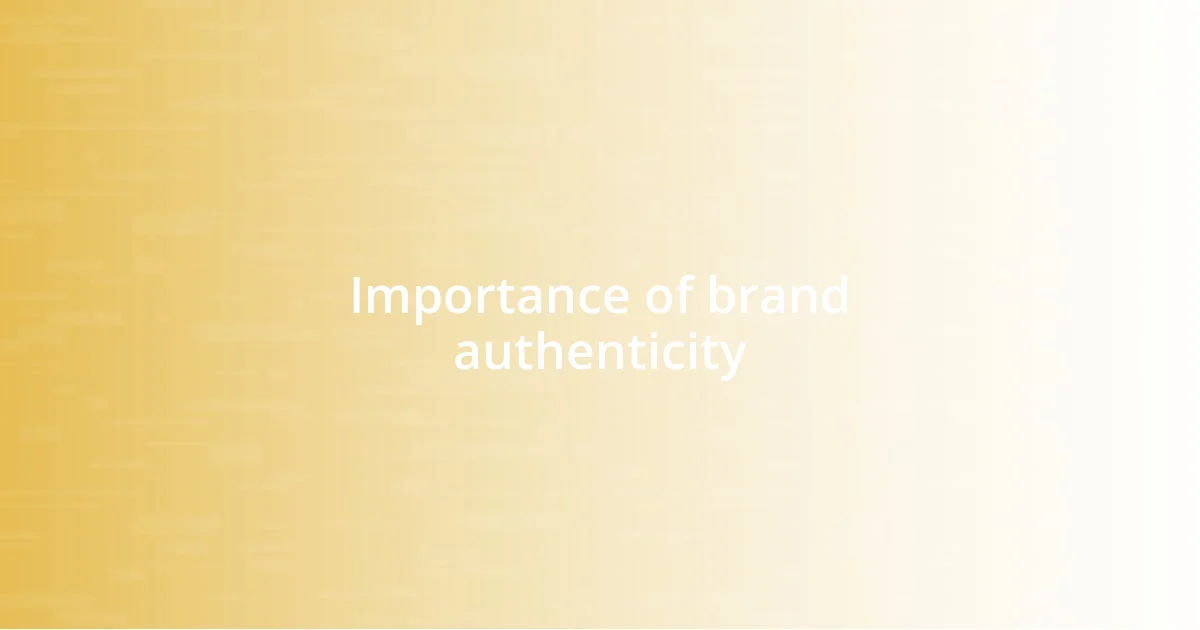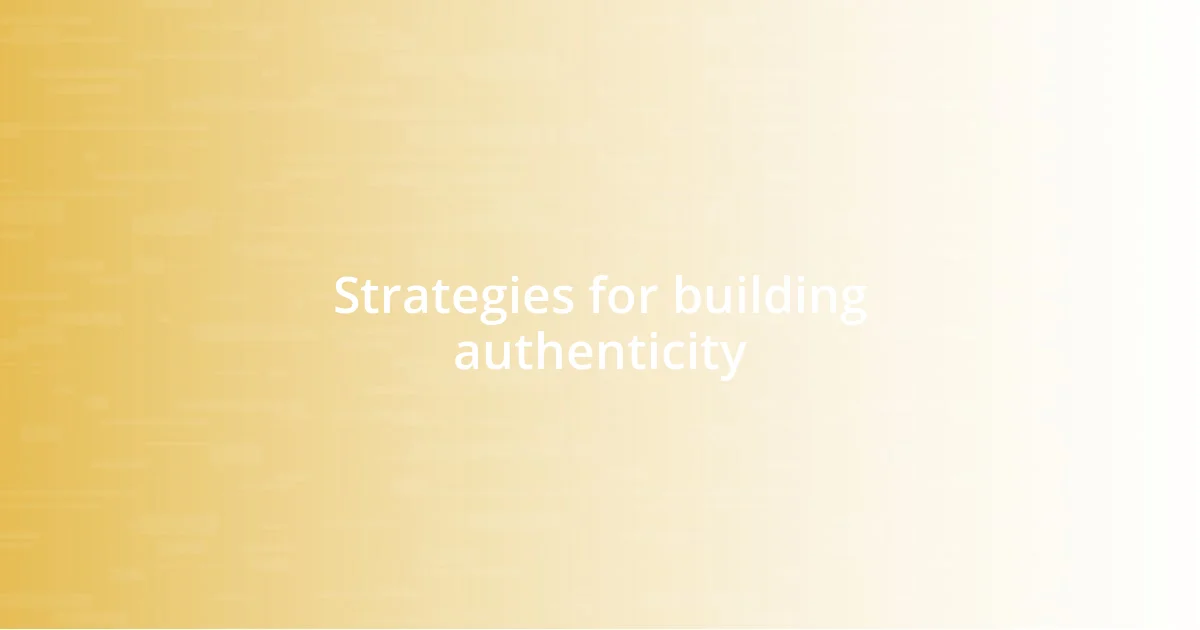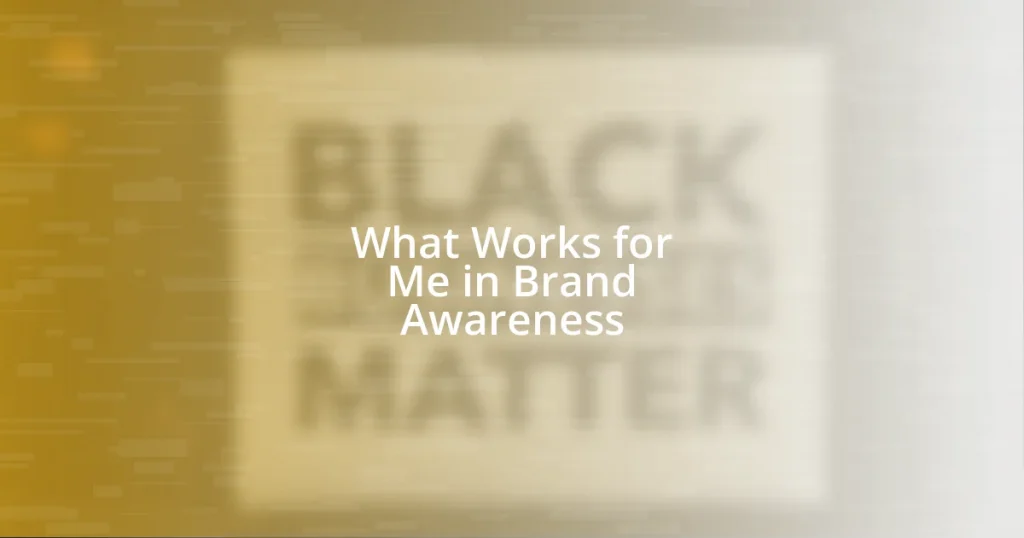Key takeaways:
- Brand authenticity is essential for building trust, emotional connections, and customer loyalty by aligning practices with values and sharing genuine stories.
- Key signs of authentic brands include consistency in messaging, active customer engagement, and transparency about their processes and challenges.
- Successful brands like Patagonia, Ben & Jerry’s, and Fenty Beauty exemplify authenticity through their commitment to sustainability, social justice, and inclusivity, fostering strong community ties.

Understanding brand authenticity
Brand authenticity is the genuine representation of a brand’s values, mission, and identity. I often think about how a brand becomes authentic when it stays true to its story, like a local café that sources ingredients from neighborhood farms, creating a sense of community. Isn’t it refreshing to see businesses that align their practices with what they preach, rather than simply following trends?
When I reflect on my favorite brands, I notice a common thread: they evoke a feeling of trust and connection. Brands like Patagonia resonate with me because their commitment to environmental sustainability isn’t just marketing fluff; it’s part of their DNA. I can’t help but admire those who stand firm in their ideals, inviting us to join their journey rather than just selling us products.
It’s interesting to consider how authenticity can influence customer loyalty. Have you ever wondered why you feel more inclined to support a brand when you hear their founder’s story? I remember feeling a deeper appreciation for a small skincare line after learning how it was born from the founder’s personal struggles with skin issues. That sincerity creates an emotional bond that transactions alone cannot forge, doesn’t it?

Importance of brand authenticity
Brand authenticity is crucial in today’s marketplace, where consumers are increasingly looking for brands that resonate with their values. I remember scrolling through social media and stumbling upon a shoe brand that highlights its production process, showing how it uses recycled materials. That transparency struck a chord with me. It made me feel that my purchase would not only satisfy my need but also contribute to a meaningful cause.
Here are some key reasons why brand authenticity matters:
- Trust Building: When a brand is authentic, it fosters a deeper sense of trust with its audience. Customers are more likely to return when they feel valued and informed.
- Emotional Connection: Authentic brands create stories that resonate emotionally, making customers feel part of something bigger. It’s like feeling you’re in a community rather than a transaction.
- Differentiation: In a crowded market, authenticity helps a brand stand out. I recall discovering a local craft beer company that proudly shared its brewing methods and local collaborations, which set it apart from larger, faceless brands.
- Loyalty and Advocacy: Authenticity often nurtures customer loyalty, turning casual buyers into passionate advocates. When I know a brand’s story and values align with mine, I’m more inclined to spread the word to friends and family.

Signs of authentic brands
When I think about the signs of authentic brands, one stands out: consistency. Authentic brands have a clear, cohesive message that aligns across all platforms—be it social media, their website, or even in-store experiences. I remember a clothing brand that maintained the same values and aesthetics since its inception, which really made me feel like they were more than just a changing trend.
Another strong indicator is engagement. Authentic brands take the time to interact with their customers. I’ve had several instances where I reached out to a tech company about a product issue, and they didn’t just respond; they followed up to ensure my problem was resolved. That kind of genuine care makes all the difference, doesn’t it?
Lastly, transparency is a hallmark. Brands that openly share their processes, values, and even their challenges resonate deeply with me. For instance, I learned about a coffee brand that openly discussed its sourcing challenges, which not only built my trust but also sparked my curiosity about how I could support ethical practices through my purchasing choices. Isn’t it refreshing to see a brand’s vulnerability?
| Sign | Description |
|---|---|
| Consistency | A cohesive message across all platforms that aligns with their core values. |
| Engagement | Actively interacting with customers and showing genuine care in their concerns. |
| Transparency | Openly sharing processes, values, and challenges to build trust and connect emotionally. |

Strategies for building authenticity
One effective strategy for building authenticity is storytelling. I recall a skincare brand that shared heartfelt stories of women whose lives were transformed through their products. Each tale added a layer of meaning that made the brand feel personal and relatable. Isn’t it amazing how a simple story can make you feel connected to something larger?
Another approach is to prioritize sustainability and social responsibility. A few years ago, I came across a home goods brand that donates a portion of every sale to environmental causes. It was comforting to know that my purchase contributes to a cause I care about. Most of the time, don’t we want our spending to reflect our values?
Engaging with consumers in meaningful ways is also crucial. I remember a tech firm that hosted open forums for customer feedback. They didn’t just listen; they acted on suggestions, reminding me that my voice mattered. This back-and-forth creates a community—something many of us crave, right? It’s all about fostering relationships that feel genuine and trustworthy.

Measuring brand authenticity
Measuring brand authenticity can sometimes feel subjective, but there are clear indicators that resonate strongly for me. One effective method is customer surveys, which reveal not just awareness of a brand’s values but also how aligned consumers feel with them. I’ll never forget the time I participated in a survey for a lifestyle brand; it was fascinating to see how many others shared my passion for their mission, which told me they were hitting the mark on authenticity.
Social media sentiment analysis is another powerful tool. By monitoring how customers talk about the brand online, companies can gauge their authenticity in real-time. When I see a brand’s posts trending positively, coupled with sincere discussions in comments, it indicates a robust connection with their audience. It makes me wonder: how often do brands forget to listen in this noisy digital landscape?
Lastly, I find that examining brand loyalty offers significant insights. If customers are not only purchasing but also advocating for a brand, you know they’ve struck an authentic chord. For example, I know loyal customers of a particular outdoor gear company who consistently share their adventures using those products. It really hits home for me—when a brand inspires genuine advocacy, it’s a clear sign that they’ve fostered an authentic relationship with their community.

Case studies of authentic brands
One brand that stands out to me in terms of authenticity is Patagonia. This outdoor clothing company has built a loyal following by committing to environmental activism and transparency about its supply chain. I remember the moment I discovered their initiative to repair and recycle old gear. It made me reflect on how much we tend to throw away instead of giving our items a second life. Isn’t it inspiring when a brand encourages us to consider our environmental impact?
Another notable example is Ben & Jerry’s, which has consistently leveraged its platform to advocate for social justice issues. I was particularly moved when they publicly supported the Black Lives Matter movement, sharing their stance on racial inequality through passionate social media campaigns. It’s a powerful reminder that brands can use their voice to uplift communities. Do we not crave connections with brands that stand for something we believe in?
Lastly, I can’t help but admire the authenticity of the beauty brand Fenty Beauty. Launched by Rihanna, it revolutionized the beauty industry with its diverse range of shades catering to all skin tones. I recall the excitement I felt when I saw my friends—each with different complexions—enthusiastically sharing their Fenty finds. It struck me that creating inclusivity wasn’t just a marketing gimmick; it genuinely transformed how we approach beauty. How often do we wish for brands that reflect our true selves? Fenty has certainly answered that call.















